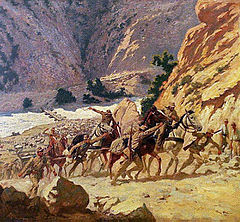Battle of Kresna Gorge
The Battle of Kresna Gorge was fought in 1913 between the Greeks and the Bulgarians during the Second Balkan War. The battle was fought over an eleven-day period, between 8–18 July, over a front of 20 km, in a maze of forests and mountains. The battle marked the last phase of Greek advances into Bulgarian territory before the ceasefire and the peace treaty.
Background[edit]
With the Serbian front static and the Bulgarian Army defeated in Greece, King Constantine I of Greece ordered his army to march deeper into Bulgarian territory and capture the Bulgarian capital, Sofia. Constantine desired a decisive victory in the war despite the objections of Prime Minister Eleftherios Venizelos who realized that the Serbs, having won their territorial objectives, were now trying to put the remaining combat of the war onto the Greeks by staying passive. A truce resulted in both sides claiming victory. From the Greek point of view, after 11 days of fighting, the Bulgarian army had apparently failed to turn the Greek flank, and as a result the Greeks considered the battle a defensive victory. The Bulgarians believed themselves victorious because their attack had stopped the Greek advance on Sofia and forced the Greeks to accept a truce. This view is supported by the view of some historians that the Greek army was threatened with encirclement and annihilation at the end of the war, although the fighting was eventually ended by an armistice. However, the Greeks argued that the Bulgarian army had put all its strength into the long battle, but lacked additional men to complete the Greek siege.
Conflict[edit]
Greek advance and breaking through the Kresna Pass[edit]
After the victorious Battle of Doiran the Greek forces continued their advances north. On 18 July, the 1st Greek Division managed to drive back the Bulgarian rear guard and captured an important foothold at the southern end of the Kresna Pass.[2]
In the pass, the Greeks were ambushed by the Bulgarian 2nd and 4th Armies which were newly arrived from the Serbian front and had taken up defensive positions. After bitter fighting, however, the Greeks managed to break through the Kresna Pass. The Greek advance continued and on 25 July, the village of Krupnik, north of the pass, was captured, forcing the Bulgarian troops to withdraw to Simitli.[3] Simitli was captured on 26 July,[4] while during the night of 27–28 July the Bulgarian forces were pushed north to Gorna Dzhumaya (now Blagoevgrad), 76 km south of Sofia.[5]
Legacy[edit]
The armistice left both parties claiming victory. From the Greek point of view, after eleven days of battle, the Bulgarians had clearly failed to turn the Greek army's flanks, and consequently the Greeks considered the battle a defensive victory.[13] The Bulgarians believed that they were the victors since their attack successfully stopped the Greek Army's advance towards Sofia and caused the Greeks to accept an armistice. This view is supported by the opinion held by most historians that although the battle was ended inconclusively by the armistice, at the end of the war, the Greek army was threatened by encirclement and annihilation.[11] The Greek claimed, however, that the Bulgarians had involved all their available forces in the prolonged battle and lacked the additional manpower to complete an encirclement of the Greek forces.


